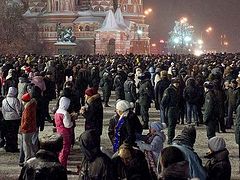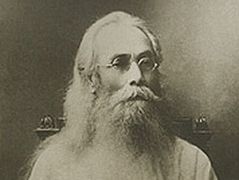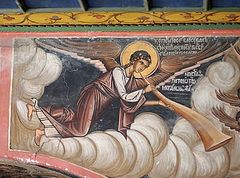SOURCE: Notes on Arab Orthodoxy
 Photo: A.Pospelov / Pravoslavie.Ru
Photo: A.Pospelov / Pravoslavie.Ru
New Year's Day, according to the Orthodox Church, does not fall on the first of January, but rather on the first of September. The Church has her own calendar that contains the seasons, feasts and celebrations along with the rites, prayers and fasts connected with them. The purpose of this calendar is to help people to reach holiness by reminding them daily of the importance of spiritual struggle in order to arrive at "life in the continuous presence of God".
On this occasion, the Church chooses to read a text from the Gospel of Saint Luke, where Christ says at the beginning of His ministry, "The Spirit of the Lord is upon Me, because He has anointed Me to preach the gospel to the poor; He has sent Me to heal the brokenhearted, to proclaim liberty to the captives and recovery of sight to the blind, to set at liberty those who are oppressed; to proclaim the acceptable year of the Lord" (Luke 4:18-19).
These verses contain the "agenda" that Christ came into the world to realize. After Jesus revealed His identity, that He is "the Lord's Christ", anointed with the Holy Spirit who rests within Him, he announced that love and free service are the path to salvation. Jesus did not call for ignoring the world and its tragedies for the sake of an individual spiritual life based on worship alone. Rather, He called for commitment to the concerns of the tormented, outcasts, the persecuted, the oppressed, the poor and the destitute...
Christianity, then, is not like some people mistakenly think, a mere "spiritual" message that does not concern the affairs of people and the world. It is a call to make our present world into a better world, a world governed by divine values, first among them love, mercy, peace and justice. On the other hand, it does not ignore the importance of spiritual struggle for the sake of this better world.
How will our coming year be a year acceptable to the Lord? How will the days and nights that we amass be acceptable? Christianity says that God, the Creator of time and space, became fully man in order to make man into a god by grace, not substance. On the other hand, those humans who desire to heed this divine call should strive to sanctify their life by consecrating their time to anticipating God's good things to come and living them in their present moment. Holiness is not complete without uniting the spiritual life with the active life incarnate in daily reality.
Christianity does not believe in luck, fate or chance. It is people who make their own luck, not psychics, prognosticators or fortune-tellers... It is in people's own hands and their own power to make their year acceptable to the Lord, since no one determines their fate besides God. Those whose fate is God will not be ashamed and will not be disappointed. God will not be people's fate if they do not do God's work. And the start of the road is repentance.
"See then that you walk circumspectly, not as fools but as wise, redeeming the time, because the days are evil" (Ephesians 5:15-16). Yes, the days are evil and we must be vigilant lest we be led along by their logic, the logic of this world. Saint Irenaeus of Lyons (d. 202) says that the time falling between Christ's becoming man and His second coming at the end is the time in which God causes the fruits of history-- that is, the saints-- to ripen. How can we turn our coming evil days into a year acceptable to the Lord? This is our hope.



